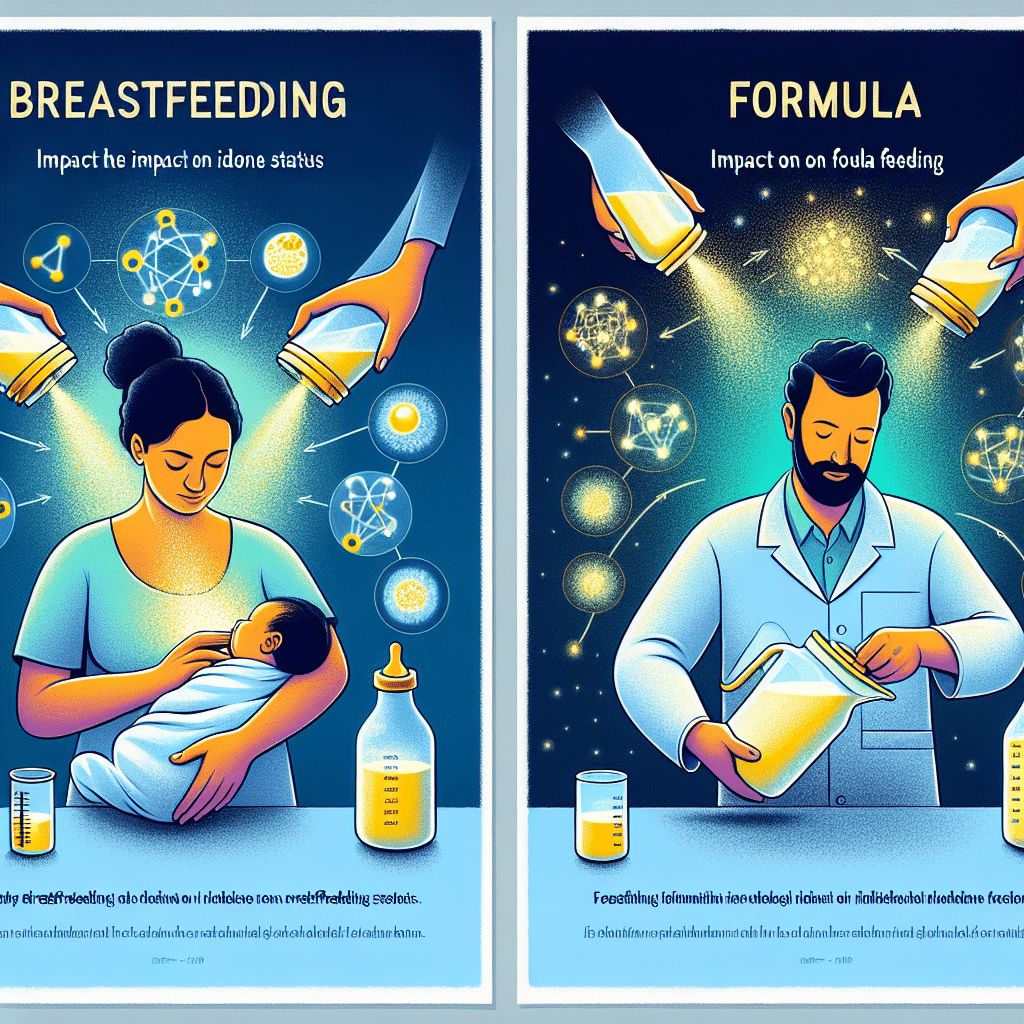Breastfeeding vs. Formula: Comparing Iodine Status Impact
-
Table of Contents
- Breastfeeding vs. Formula: Evaluating the Impact on Iodine Status
- The Importance of Iodine in Early Development
- Breastfeeding and Iodine: A Natural Source
- Formula Feeding and Iodine: Fortification Matters
- Comparing Iodine Status in Breastfed and Formula-Fed Infants
- Case Studies and Global Perspectives
- Conclusion: Balancing Breastfeeding and Formula for Optimal Iodine Intake
- ETChem: Enhancing Nutrition with High-Quality Protein Products
Breastfeeding vs. Formula: Evaluating the Impact on Iodine Status
When it comes to infant nutrition, the debate between breastfeeding and formula feeding is one that has persisted for decades. While both methods have their advantages and disadvantages, one aspect that often gets overlooked is the impact on iodine status in infants. Iodine is a critical micronutrient necessary for the production of thyroid hormones, which are essential for brain development and growth in infants. This article delves into the comparison between breastfeeding and formula feeding in terms of iodine status impact, supported by scientific research, case studies, and statistics.
The Importance of Iodine in Early Development
Iodine is a trace element that is vital for the synthesis of thyroid hormones. These hormones, thyroxine (T4) and triiodothyronine (T3), play a crucial role in the development of the nervous system, particularly during the prenatal period and the first few years of life. An adequate iodine intake is essential for pregnant and lactating women to ensure the health and development of their children.
- Thyroid hormones are responsible for regulating metabolism, growth, and brain development.
- Iodine deficiency can lead to a range of health issues, including cognitive impairment and developmental delays.
- The World Health Organization (WHO) recommends a daily intake of 90-120 micrograms of iodine for infants up to 6 months of age.
Breastfeeding and Iodine: A Natural Source
Breast milk is considered the gold standard for infant nutrition. It provides a complete source of nutrients, including iodine, tailored to the infant’s needs. The iodine content of breast milk is influenced by the mother’s dietary intake and her iodine status.
- Studies have shown that breastfed infants typically have adequate iodine levels if the mother’s intake is sufficient.
- Exclusive breastfeeding for the first six months is recommended by health organizations for optimal infant health and development.
- Lactating mothers are advised to maintain an adequate iodine intake through diet or supplementation to ensure sufficient levels in breast milk.
Formula Feeding and Iodine: Fortification Matters
Infant formulas are designed to mimic breast milk and provide an alternative source of nutrition for infants who cannot be breastfed. Formula manufacturers fortify their products with iodine to meet the nutritional requirements of infants.
- The iodine content in formula is regulated and must meet specific standards to ensure infants receive an adequate amount.
- Some studies suggest that formula-fed infants may have higher iodine levels than breastfed infants, depending on the fortification levels and the mother’s iodine status.
- Parents should choose infant formulas that are appropriately fortified with iodine, as per regulatory guidelines.
Comparing Iodine Status in Breastfed and Formula-Fed Infants
Research comparing the iodine status of breastfed and formula-fed infants has yielded mixed results. Several factors contribute to these differences, including maternal iodine intake, the iodine content of formula, and geographical variations in iodine availability.
- A study published in the Journal of Clinical Endocrinology & Metabolism found that breastfed infants had lower urinary iodine concentrations than formula-fed infants, suggesting differences in iodine intake.
- Another study in the European Journal of Nutrition reported that both breastfed and formula-fed infants had adequate iodine status, but the levels were higher in formula-fed infants.
- Geographical studies indicate that in areas with iodine-deficient soils, breastfed infants may be at a higher risk of iodine deficiency if maternal intake is not supplemented.
Case Studies and Global Perspectives
Case studies from around the world provide insight into the impact of breastfeeding and formula feeding on iodine status in different populations.
- In iodine-sufficient regions, both breastfeeding and formula feeding can provide adequate iodine to infants.
- In iodine-deficient regions, supplementation programs for pregnant and lactating women have been successful in improving iodine status in breastfed infants.
- Some countries have implemented universal salt iodization programs to ensure that all populations, including infants, receive enough iodine.
Conclusion: Balancing Breastfeeding and Formula for Optimal Iodine Intake
In conclusion, both breastfeeding and formula feeding can provide adequate iodine to infants, but the key is ensuring that either the mother’s diet (in the case of breastfeeding) or the infant formula (in the case of formula feeding) contains sufficient levels of this essential nutrient. Health professionals should guide parents on maintaining optimal iodine intake for themselves and their infants, regardless of the feeding method chosen. By understanding the importance of iodine in early development and the role of diet and fortification, parents can make informed decisions to support their child’s health and growth.
ETChem: Enhancing Nutrition with High-Quality Protein Products
For those looking to enhance their nutritional intake, ETChem offers a range of high-quality protein products. Their extensive selection of collagens, including marine, fish, bovine, and chicken collagens, provides a variety of options to meet individual dietary needs. ETChem’s products are characterized by their neutral taste and instant solubility, making them an excellent addition to any health and wellness regimen.
Whether you are a manufacturer looking for premium ingredients or an individual seeking to boost your protein intake, ETChem’s offerings cater to a diverse range of industries and consumers. Their commitment to quality and customer satisfaction makes them a top choice for protein products.
About ETChem:
ETChem, a reputable Chinese Collagen factory manufacturer and supplier, is renowned for producing, stocking, exporting, and delivering the highest quality collagens. They include marine collagen, fish collagen, bovine collagen, chicken collagen, type I collagen, type II collagen and type III collagen etc. Their offerings, characterized by a neutral taste, instant solubility attributes, cater to a diverse range of industries. They serve nutraceutical, pharmaceutical, cosmeceutical, veterinary, as well as food and beverage finished product distributors, traders, and manufacturers across Europe, USA, Canada, Australia, Thailand, Japan, Korea, Brazil, and Chile, among others.
ETChem specialization includes exporting and delivering tailor-made collagen powder and finished collagen nutritional supplements. Their extensive product range covers sectors like Food and Beverage, Sports Nutrition, Weight Management, Dietary Supplements, Health and Wellness Products, ensuring comprehensive solutions to meet all your protein needs.
As a trusted company by leading global food and beverage brands and Fortune 500 companies, ETChem reinforces China’s reputation in the global arena. For more information or to sample their products, please contact them and email karen(at)et-chem.com today.





